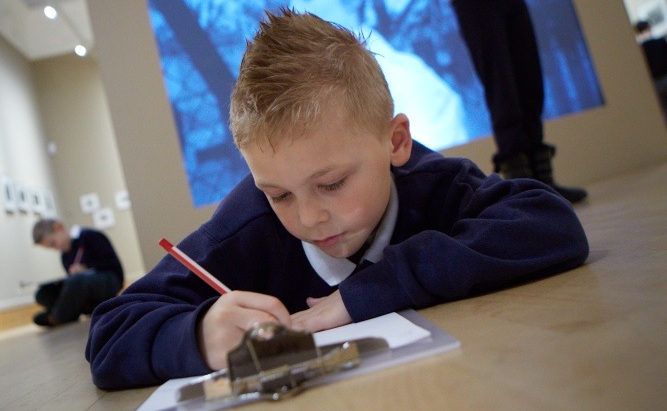
March 10, 2014, by Guest blog
Lakeside Literacy Volunteers: The David Ross Collection
This blog post was written by third year Creative Writing student Matthew Lewis Miller from the School of Education.
A few months ago, Clare Harvey and Ruth Lewis-Jones rudely interrupted one of my valuable university morning classes to tell me about the Lakeside Literacy Volunteers. I am very glad that they did. Over the last few weeks, I have been involved in the organisation and facilitation of workshops for school-groups who have visited the Pop Art to Britart exhibition hosted at the Djanogly Gallery and it has been a fantastic experience.
The exhibition was comprised of a wide collection of PopArt pieces which had been lent to the gallery by David Ross, an entrepreneur and alumni of Nottingham University. Each week, a visiting group of school children were invited to look around the exhibition and use the art displayed as an impetus to create poems.
Firstly, the participants were offered the opportunity to move freely through the gallery, viewing as many pieces as possible. We then gathered them back and gave each of them a gold star. The idea then was that each participant should choose a favourite piece of art and attempt to describe it in one word. They then wrote this word on the back of the gold star, which they placed in front of the piece of art they had chosen. As a group we then circled the gallery, stopping at every piece with one or more gold stars in front of it, and then asked the children for more words, which were hastily scribbled down by me on individual pieces of paper. ‘How does this piece make you feel?’ we asked the children. ‘What is its texture? What does it make you think of? Give us a word.’ There were some impressively insightful contributions.
By this point in the workshop, we have built up a stockpile of words of all kinds from the participants responses – nouns, adjectives and verbs a-plenty. We then added to this stockpile with a freeze frame game in which half the class at a time used one of the words already gathered as a trigger to create a freeze frame, which the other half of the class wrote more words about. Writing words about people making pictures with their bodies based on words written about pictures; it sounds like it’s starting to become convoluted, but really, this workshop was an incredible effective method of building a vast bank of resources from which to create poems, one easy step at a time.
Creation of poems was the next stage, and we used a form known as a ‘myku’, similar to a haiku in its use of a 5,7,5 structure, but asking for a word count rather than a syllable count: 1st line; 5 words, 2nd line; 7 words, 3rd line; 5 words. All the collected words spread out on the floor. Participants sit in a circle around the edges with worksheets and simply fill them out. And there were some fantastic poems. Truly lovely, original thoughts.
The beauty of this workshop is that it makes writing a poem – a potentially daunting task for a group of 9 or 10 year olds – incredibly straightforward. By stretching out the process of observation, evaluation and response, rather than jumping straight towards a directly creative exercise, the creativity of the group was allowed a slowburn which produced effortlessly good results by the end of a two hour workshop.
Personally, I’ve enjoyed taking part as a facilitator greatly. It allows me to implement a host of skills I’ve developed both through my university course and outside of it in a direct environment and has shaped in me a burgeoning desire to teach at primary level – a new ambition, and not something I’d previously have thought I’d be quite as interested in. Seeing the pride many of the participating children had in their work and their enjoyment of the process was great to see. Definitely lessons to be learned for my own creativity also – rush isn’t always productive. Steady building of ideas, collaboration, time for thought – that’s what has made this workshop a very successful one. Working with this group has opened doors and I’m looking forward to the next exhibition. So I’ll forgive Clare and Ruth the lost ten minutes of oh so precious university education those few months back.
No comments yet, fill out a comment to be the first

Leave a Reply